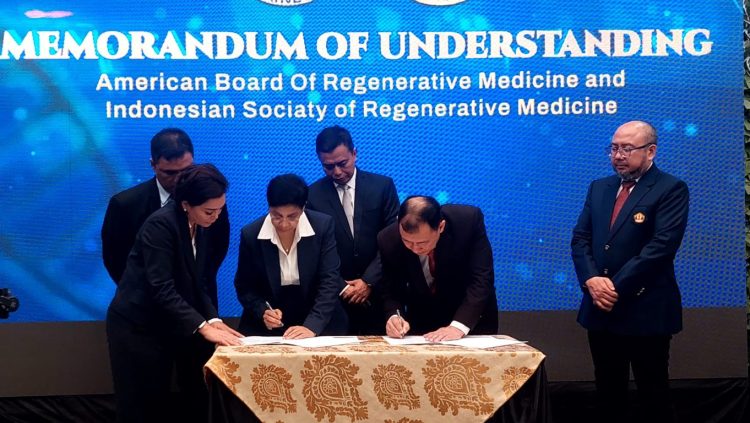Indonesia has taken a major step forward in advancing its medical capabilities with the official launch of the Indonesian Society of Regenerative Medicine (INASRM). This milestone not only marks a crucial development in the country’s healthcare system but also reflects Indonesia’s increasing alignment with global medical standards. Backed by both domestic and international institutions, this initiative aims to position Indonesia as a future leader in regenerative medicine in Southeast Asia.
What Is the Indonesian Society of Regenerative Medicine?
The Indonesian Society of Regenerative Medicine was established to standardize, regulate, and promote regenerative medical practices—particularly in stem cell therapy—across the country. The society brings together leading hospitals, private clinics, and academic institutions under one coordinated body.
The official launch event also celebrated the first batch of graduates from a diploma program in regenerative medicine, highlighting the commitment to building a professional workforce trained under international standards.
This program was developed through collaboration among INASRM, RSPAD Gatot Subroto (a leading Indonesian military hospital), the Jakarta Stem Cell Center (JSC), and the American Board of Regenerative Medicine (ABRM). The ABRM’s involvement adds significant credibility, as it provides international certification and mentorship.
Key Partnerships and International Recognition
One of the major strengths of the program is its international scope. Through partnerships with global organizations like the American Society of Regenerative Medicine (ASRM) and ABRM, the Indonesian medical community gains access to best practices and updated global protocols.
During the inauguration, Rozina Badal Munir, Global Development Director of ASRM, personally attended the event, emphasizing strong international support. Meanwhile, Indonesia’s Ministry of Health was represented by Professor Amin Soebandrio, Chair of the Stem Cell Committee, who praised the initiative and emphasized the Ministry’s support for responsible stem cell research and implementation.
The international dimension of this collaboration helps ensure that Indonesia’s regenerative medicine practices are ethically sound, scientifically valid, and globally competitive.
The Role of RSPAD and Jakarta Stem Cell Center
At the national level, RSPAD Gatot Subroto plays a critical role in implementing and overseeing clinical standards. Under the new framework, RSPAD has been granted authority to mentor both public and private hospitals looking to offer stem cell therapy.
The Jakarta Stem Cell Center has been named as the secretariat partner of INASRM and serves as a key operational driver for the training and certification programs. This collaboration ensures that not only are the medical practitioners trained, but also that the infrastructure and ethical frameworks are being established properly.
Regenerative Medicine in Indonesia: Why It Matters
Regenerative medicine, especially stem cell therapy, has shown promise in treating chronic illnesses, autoimmune diseases, and even certain forms of cancer. With the rise in non-communicable diseases in Indonesia—such as diabetes, stroke, and heart disease—having access to cutting-edge treatment methods is essential.
The establishment of the Indonesian Society of Regenerative Medicine aims to:
- Standardize practices across hospitals and clinics
- Train medical professionals under globally accepted frameworks
- Promote research and innovation in regenerative treatments
- Ensure patient safety and ethical application of advanced therapies
As a result, patients across Indonesia could gain access to life-saving treatments that were previously only available abroad.
Government Support and Policy Integration
The Indonesian government, through its Ministry of Health, has expressed strong support for the society. By integrating regenerative medicine into national health strategies, the country signals its readiness to move from being a consumer of imported treatments to a provider of certified, high-standard solutions.
This policy alignment is crucial as it encourages investment in medical research, private-public partnerships, and hospital infrastructure upgrades, all of which are necessary for a sustainable regenerative medicine ecosystem.
Challenges and the Road Ahead
Despite the excitement, challenges remain. One of the biggest hurdles is ensuring that hospitals and clinics across Indonesia are equipped to meet the standards set by INASRM and its partners. This includes infrastructure, skilled personnel, and consistent monitoring.
Moreover, public awareness about regenerative medicine is still limited. Many patients may remain skeptical or uninformed about stem cell therapies. To overcome this, INASRM and its partners must work closely with media, educational institutions, and local health authorities to promote scientifically accurate information and combat misinformation.
There is also a regulatory aspect. Indonesia must ensure that its policies on stem cell research and treatment are strict enough to prevent malpractice, while still encouraging innovation.
Conclusion
The launch of the Indonesian Society of Regenerative Medicine is a significant milestone in the country's journey toward becoming a leader in advanced medical treatments. With strong backing from international organizations and domestic institutions, this initiative could redefine the healthcare landscape in Indonesia.
By focusing on education, standardization, and global collaboration, Indonesia is not just investing in its medical future—but also making a bold statement to the world: that it is ready to lead in regenerative medicine.
Read More






 Wednesday, 04-03-26
Wednesday, 04-03-26







